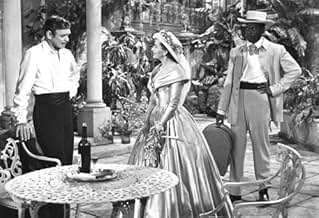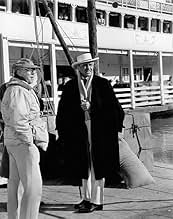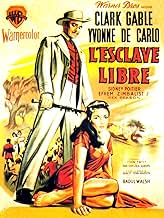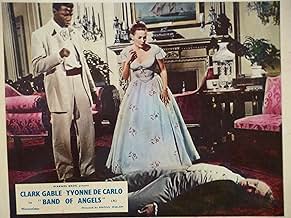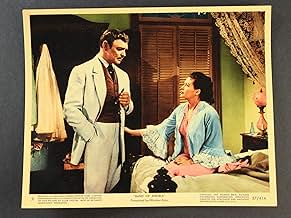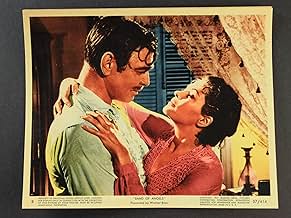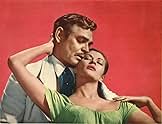Amantha Starr grows up as a privileged Southern belle in the ante-bellum South, but after her father dies broke, her world is destroyed when she discovers that her mother was Black.Amantha Starr grows up as a privileged Southern belle in the ante-bellum South, but after her father dies broke, her world is destroyed when she discovers that her mother was Black.Amantha Starr grows up as a privileged Southern belle in the ante-bellum South, but after her father dies broke, her world is destroyed when she discovers that her mother was Black.
- Jimmee
- (as Russ Evans)
- Gillespie
- (uncredited)
- Auction Guest
- (uncredited)
- Auctioneer
- (uncredited)
- Maj. Gen. Benjamin Butler
- (uncredited)
Featured reviews
Indeed, no one is at their best in this film--not Clark Gable, as an older and tired looking version of Rhett Butler, nor beautiful Yvonne de Carlo--each given some of the worst dialogue any actors have ever been saddled with. It's a murky tale of a plantation owner in love with a woman of mixed ancestry. Patric Knowles and Sidney Poitier try to bring some semblance of dignity to the acting but there's simply too much tripe to allow anyone to look good. And by the way, it's not based on a Frank Yerby novel, as someone has said previously. It's based on a novel by Robert Penn Warren which I hope was better than the movie. Had to be.
Only the Steiner score provides a point of interest. Certainly nowhere near the level of that other Civil War epic starring Gable. No way!
Band of Angels is one of many pictures from this time to take a stand on racial issues, and yet even by the standards of the time it is a woefully misguided attempt. Rather than using Yvonne De Carlo's situation to demonstrate the horrors of slavery and make the point that a person's colour is skin deep, it seems to present her being branded black as something horrifying in itself. It holds up kindly masters in mitigation of slavery, and even goes so far as to condemn a slave (the Sidney Poitier character) who is ungrateful for this condescending attitude. There's also a full supporting cast of cringeworthy stereotypes – including a "mammy" – and all the drawling and eye-rolling that cinema had mostly put-paid to by this time. The makers of the movie meant well, I'm sure, but it is clearly a case of old Hollywood trying to do The Defiant Ones while still stuck in Gone with the Wind mode.
And yet there is much to be said for old Hollywood. Walsh's dynamic direction brings an iconic look to scenes like Gable and De Carlo's kiss during the storm. He brings real intensity to the duel between Gable and Raymond Bailey, stealthily moving the camera forward as the two men get closer to each other (a trick he first used in his 1915 feature debut, Regeneration). Despite his age Gable is still very much the virile, eye-catching lead man, and this is a decent performance from him – check out the look in his eyes when he slaps his rival at the slave auction. There is also some achingly beautiful cinematography from Lucien Ballard, with some gorgeous Southern scenery and really effective lighting of interiors, achieving a look with candlelight and shadow that was hard to pull off in Technicolor. Band of Angels is, if nothing else, a movie to be enjoyed visually – and in this way more than any other harks back to a bygone age.
"Band of Angels" is a romantic epic that seems to be a soap opera with a story with many twists. The plot seems to be a melodramatic version of "Gone with the Wind" and Rau-Ru first attitude is ungrateful. The best moment of this melodrama is when Amantha discovers that she is considered a black woman and consequently a slave. Her situation is impressive and heartbreaking. The spoiled woman is suddenly transformed into a property of despicable men. My vote is seven.
Title (Brazil): "Meu Pecado Foi Nascer" ("My Sin Was to be Born")
That now out of the way, there's more at work that to my mind saves this movie. Supported by Sidney Poitier and Efrem Zimbalist Jr., Clark Gable and Yvonne deCarlo play the lead pair, who openly 'live in sin' and are otherwise reprehensible. All the same, both are portrayed sympathetically. Set in the 'Gone with the Wind' period, Gable plays an ex-slaver and cotton-grower who once prowled his plantation's slave shacks for his jollies. She is the shameful issue of a liaison with a slave on another plantation, and it's even suggested that she fools around on Gable while he's away on business.
This movie's clearly no gem, but it's no dreck. However maudlin and overdone, its basic theme of the redemptive power of love is fairly well handled. The era and settings are unusual and atmospheric enough to hold the viewer's interest, and I had no difficulty with plot over-entanglements even if my credulity was strained now and then.
It may well have been Yvonne De Carlo's best film, and Gable also did a fair job with an okay script (something not unusual while the studios struggled to survive). Sidney Poitier has a small but meaty role as an educated slave with a deep grudge. Efrem Zimbalist Jr. got his first speaking part in this film, and acquits himself smoothly with limited material. Max Steiner grinds out a spotty sountrack that's effective only in the chase scenes, and then only just ...yet a Rozsa or Korngold he never was.
The Warnercolour's glorious, and the art direction is especially fine, with atmospheric scenes especially in the Gable character's New Orleans pied-a-terre and (less so) in his plantation mansion. Mind you, it's all 100% 1950s Hollywood, and very pristine and polished ...but let's not expect too much from the era, when Edith Head primped up the women and the idea of onscreen grime, sweat or facial stubble as far off as spaghetti westerns.
A fairly good film from the 50s, in short: its eventful, sometimes quirky plot, more than passable acting and some unusual settings make most of it very watchable.
Did you know
- TriviaThe film proved to be a complete failure on release, both critically and commercially. Clark Gable was annoyed by the comparisons with Gone with the Wind (1939) and instructed his agent, "If it doesn't suit an old geezer with false teeth, forget about it." He also decided to part company with Raoul Walsh, previously one of his favorite directors.
- GoofsAt 40 minutes, the heroine takes off her stockings, which were not yet available in those days.
- Quotes
Amantha Starr: You say you won't touch me. You give me your *word* as a gentleman. Well, what's to stop you from breakin' your word late one night and forcin' yourself on me while I sleep?
Hamish Bond: [grins] Only the word of a gentleman.
Amantha Starr: [late that night, unable to sleep] He said he wouldn't. But those are his footsteps, coming down the hall. Coming closer!
Amantha Starr: [listens tensely] He didn't! Not tonight, anyway. Why not?
[Amantha frowns at first, then thinking it over, gradually falls asleep]
- ConnectionsEdited into La classe américaine (1993)
- SoundtracksBand of Angels
(uncredited)
Music by Max Steiner
Lyrics by Carl Sigman
[Sung by chorus over main titles]
- How long is Band of Angels?Powered by Alexa
Details
- Release date
- Country of origin
- Languages
- Also known as
- Andjeoski venac
- Filming locations
- Production companies
- See more company credits at IMDbPro
Box office
- Gross worldwide
- $315
- Runtime
- 2h 5m(125 min)
- Aspect ratio
- 1.85 : 1


